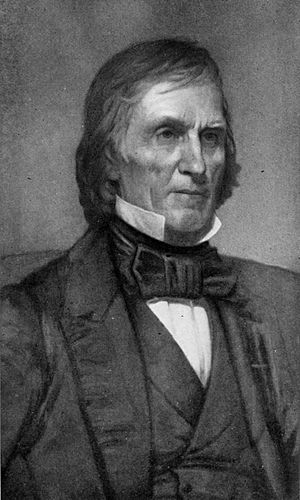Josiah Willard Gibbs Sr. facts for kids
Quick facts for kids
Josiah Willard Gibbs Sr.
|
|
|---|---|

Prof. Josiah Willard Gibbs Sr., from a portrait by F. B. Carpenter
|
|
| Born | April 30, 1790 Salem, Massachusetts |
| Died | March 25, 1861 (aged 70) New Haven, Connecticut |
| Occupation | Theologian, linguist, librarian |
Josiah Willard Gibbs Sr. (born April 30, 1790 – died March 25, 1861) was an American expert in languages and religion. He taught about sacred literature at Yale University. Today, he is mostly remembered for his important role in the famous Amistad court case. He was also the father of the well-known scientist Josiah Willard Gibbs.
Contents
Early Life and Learning
Josiah Gibbs was born in Salem, Massachusetts. His family had lived in New England for a long time and had a history of being scholars. His parents were Henry and Mercy (Prescott) Gibbs. His mother's sister was married to Roger Sherman, one of the Founding Fathers of the United States. Also, one of Josiah's ancestors, Samuel Willard, was the acting president of Harvard College many years before.
Josiah Gibbs finished his studies at Yale College in 1809. He then worked as a tutor there from 1811 to 1815. After that, he moved to Andover, Massachusetts, to study Hebrew and the Bible on his own. He learned from a teacher named Moses Stuart.
In 1824, Gibbs returned to Yale. He became a lecturer in the Theological Institution of Yale College. Later, he became a professor at Yale Divinity School. He taught sacred literature there until he passed away.
Academic Work and Studies
Josiah Gibbs was a minister in the Congregational church. He was allowed to preach, but he did not do it very often. Instead, he focused more and more on linguistics, which is the study of language. He was very interested in the ideas of scholars from Germany, like Wilhelm Gesenius.
Gibbs tried to translate a new Hebrew dictionary from German into English twice. However, each time, another scholar finished the translation before him. These experiences made him want to learn even more languages. They also encouraged him to explore new areas in language studies.
His most important book, Philological Studies, was published in 1857. He also worked with James Gates Percival to update Noah Webster's dictionary. Gibbs created lists of words for Hebrew, Greek, and Arabic. He also made word lists for several Native American languages. From 1824 to 1843, he also worked as the librarian for Yale College. In 1826, he became a member of the American Antiquarian Society.
Helping in the Amistad Case
Josiah Gibbs was a strong supporter of ending slavery. He played a very important part in the Amistad court cases in 1839–1840. The Amistad was a ship where enslaved Africans had taken control.
Gibbs visited the African passengers while they were in jail. He showed them piles of pennies. By doing this, he learned to count to ten in their language, which was Mende. Then, Gibbs walked around the harbors in New Haven and New York City. He counted out loud from one to ten using the Mende words he had learned.
This clever method helped him meet two British sailors, James Covey and Charles Pratt. They recognized the Mende words and could speak the language. These sailors then became interpreters for the Africans. They also taught some Mende to Gibbs and another Yale professor, George E. Day. This allowed them to talk with at least 20 of the captives.
Gibbs and Day spoke in court as expert witnesses. They proved that the ship owners' claim was false. The owners had said the black passengers were slaves born in Cuba. However, Gibbs and Day showed this was not true. Covey, the interpreter, helped the Africans tell their own stories in court. This allowed them to defend themselves against charges of mutiny and murder. Later, Gibbs collected and published word lists for Mende and other West African languages.
Family Life
Josiah Gibbs married Mary Anna Van Cleve in September 1830. They had four daughters and one son. Their son, Josiah Willard Gibbs, became a very famous scientist. Both Josiah Gibbs Sr. and his son passed away in New Haven. They are buried in the Grove Street Cemetery there. Even though they had the same official first name, the father was usually called Josiah Gibbs. His son was known as Willard Gibbs.
Josiah Gibbs's son-in-law, Addison Van Name, later became the librarian of Yale University. He held that job from 1865 until 1904.
In Movies
Josiah Gibbs was played by actor Austin Pendleton in the 1997 movie Amistad. This film was directed by Steven Spielberg.
 | Laphonza Butler |
 | Daisy Bates |
 | Elizabeth Piper Ensley |

